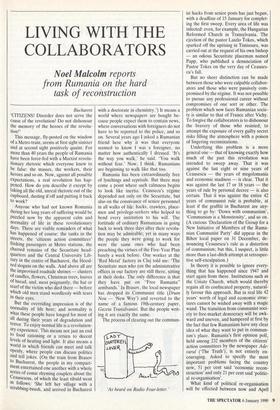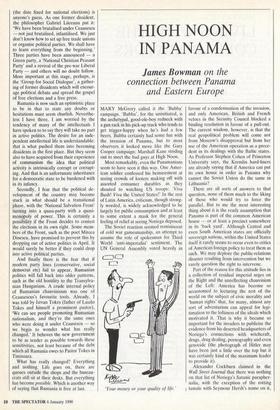LIVING WITH THE COLLABORATORS
Noel Malcolm reports
from Rumania on the hard task of reconstruction
Bucharest 'CITIZENS! Disorder does not serve the cause of the revolution! Do not dishonour the memory of the heroes of the revolu- tion!'
This message, fly-posted on the window of a Metro train, seems at first sight sinister and at second sight positively quaint. For more than 40 years the people of Rumania have been force-fed with a Marxist revolu- tionary rhetoric which everyone knew to be false: the masses, the workers, their heroes and so on. Now, against all possible expectations, a real revolution has hap- pened. How do you describe it except by taking all the old, unreal rhetoric out of the cupboard, dusting if off and putting it back to work?
Anyone who had not known Romania during her long years of suffering would be puzzled now by the apparent calm and normality of life in these revolutionary days. There are visible reminders of what has happened of course: the tanks in the streets, the 'citizens action committees' frisking passengers at Metro stations, the charred remains of the Securitate head- quarters and the Central University Lib- rary in the centre of Bucharest, the blood- red slogans on the walls. And above all are the improvised roadside shrines — clusters of candles, flowers, Christmas trees, loaves of bread, and, most poignantly, the hat or scarf of the victim who died there — before which old men stand wordlessly with tears in their eyes. But the overriding impression is of the normality of life here; and normality is what these people have longed for most of all during their years of degradation and terror. To enjoy normal life is a revolution- ary experience. This means not just an end to food rationing or a return to decent levels of heating and light. It also means a world in which friends can meet and talk openly, where people can discuss politics and tell jokes. (On the train from Brasov to Bucharest, the people in my compart- ment entertained one another with a whole series of comic rhyming couplets about the Ceausescus, of which the least ribald went as follows: 'She left her village with a scrubbing-brush, and arrived in Bucharest with a doctorate in chemistry.') It means a world where newspapers are bought be- cause people expect them to contain news, where conversations with foreigners do not have to be reported to the police, and so on. Several years ago I asked a Rumanian friend here why it was that everyone seemed to know I was a foreigner, no matter how authentically I dressed. 'It's the way you walk,' he said. 'You walk without fear.' Now, I think, Rumanians are beginning to walk like that too.
Rumania has been extraordinarily free of lynchings and reprisals. But there may come a point where such calmness begins to look like inertia. Ceausecu's regime depended not only on the Securitate, but also on the connivance of senior personnel in all walks of lift: hacks, crawlers, place- men and privilege-seekers who helped to bend every institution to his will. The fortitude of ordinary Rumanians in going back to work three days after their revolu- tion may be admirable; yet in many ways the people they were going to work for were the same ones who had been preaching the virtues of the Five-Year Plan barely a week before. One worker at the 'Red Metal' factory in Cluj told me: 'The Securitate men who ran the administrative offices in our factory are still there, sitting at their desks. The only difference is that they have put on "Free Rumania" armbands.' In Brasov, the local newspaper has dropped its Communist title (Drum Nou 'New Way') and reverted to the name of a famous 19th-century paper, Gazeta Transilvaniei. But the people writ- ing it are exactly the same.
The process of clearing out the commun- 'As heard on Radio Four-letter.' ist hacks from senior posts has just begun, with a deadline of 15 January for complet- ing the first sweep. Every area of life was infected: even, for example, the Hungarian Reformed Church in Transylvania. The ejection of the pastor Laszlo Tokes, which sparked off the uprising in Timisoara, was carried out at the request of his own bishop — an odious Securitate placeman named Papp, who published a denunciation of Pastor Tokes on the very day of Ceauses- cu's fall.
But no sheer distinction can be made between those who were culpable collabor- ators and those who were passively com- promised by the regime. It was not possible to pursue any professional career without compromises of one sort or other. The problem which now faces Rumanian socie- ty is similar to that of France after Vichy.
To forgive the collaborators is to dishonour the bravery of those who resisted; to attempt the exposure of every guilty secret risks filling the atmosphere with a poison of lingering recriminations.
Underlying this problem is a more general one — that of knowing exactly how much of the past this revolution was intended to sweep away. That it was against the last eight or nine years of Ceausescu — the years of megolomania and economic madness — is clear. That it was against the last 17 or 18 years — the years of rule by personal decree — is also certain. That it was against the entire 42 years of communist rule is probable, at least if the graffiti in Bucharest are any- thing to go by 'Down with communism', 'Communism is a Monstrosity', and so on.
(A curious 'Declaration of the Group for a New Initiative of Members of the Ruma- nian Communist Party' did appear in the
Bihor local paper on 31 December, de- nouncing Ceausescu's rule as a distortion of communism; but this, I suspect, is little more than a last-ditch attempt at retrospec- tive self-exculpation.)
In theory it is possible to ignore every- thing that has happened since 1947 and start again from there. Institutions such as the Uniate Church, which would thereby regain all its confiscated property, natural- ly favour this approach. But in real life 42 years' worth of legal and economic struc- tures cannot be wished away with a magic wand. The transition from communist soci- ety to free-market democracy will be awk- ward and uneven, and hampered at first by the fact that few Rumanians have any clear idea of what they want to put in commun- ism's place. Rumania's first opinion poll, held among 232 members of the citizens'
action committees by the newspaper Ade- varul (The Truth'), is not entirely en-
couraging. Asked to specify the most important problems facing the country now, 51 per cent said 'economic recon- struction' and only 21 per cent said 'politic- al re-organisation'.
What kind of political re-organisation will be effected between now and April (the date fixed for national elections) is anyone's guess. As one former dissident, the philosopher Gabriel Liiceanu put it: `We have been brutalised under Ceausescu — not just brutalised, infantilised. We just don't know how to set up free trade unions or organise political parties. We shall have to learn everything from the beginning.' Three parties have been announced — a Green party, a 'National Christian Peasant Party' and a revival of the pre-war Liberal Party — and others will no doubt follow. More important at this stage, perhaps, is the 'Group for Social Dialogue', a gather- ing of former dissidents which will encour- age political debate and spread the gospel of free elections and a free press.
Rumania is now such an optimistic place to be in that to state any doubts or hesitations must seem churlish. Neverthe- less I have three. I am worried by the tendency of many of the intellectuals I have spoken to to say they will take no part in active politics. The desire for an inde- pendent intellectual life is understandable: that is what pushed them into becoming dissidents in the first place. But they seem also to have acquired from their experience of communism the idea that political activity is intrinsically corrupt or corrupt- ing. And that is an unfortunate inheritance for a democratic state to be burdened with in its infancy.
Secondly, I fear that the political de- velopment of the country may become stuck in what should be a transitional phase, with the 'National Salvation Front' turning into a quasi-party with a quasi- monopoly of power. This is certainly a possibility if the Front decides to contest the elections in its own right. Some mem- bers of the Front, such as the poet Mircea Dinescu, have promised to prevent this by dropping out of active politics in April. It would surely be better if they could drop into active political parties.
And finally there is the fear that if modern party lines (conservative, social democrat etc) fail to appear, Rumanian politics will fall back into older patterns, such as the old hostility to the Transylva- nian Hungarians. A crude internal policy of Rumanian chauvinisum was one of Ceauseicus's favourite tools. Already, I was told by Istvan Tokes (father of Laszlo Tokes and himself a prominent pastor), 'We can see people promoting Rumanian nationalism, and they're the same ones who were doing it under Ceausescu — so we begin to wonder what has really changed.' It behoves the new government to be as tender as possible towards these sensitivities, not least because of the debt which all Rumania owes to Pastor Tokes in Timisoara.
What has really changed? Everything and nothing. Life goes on, there are queues outside the shops and the bureau- crats still sit at their desks. But everything has become possible. Which is another way of saying that Rumania is free at last.











































 Previous page
Previous page